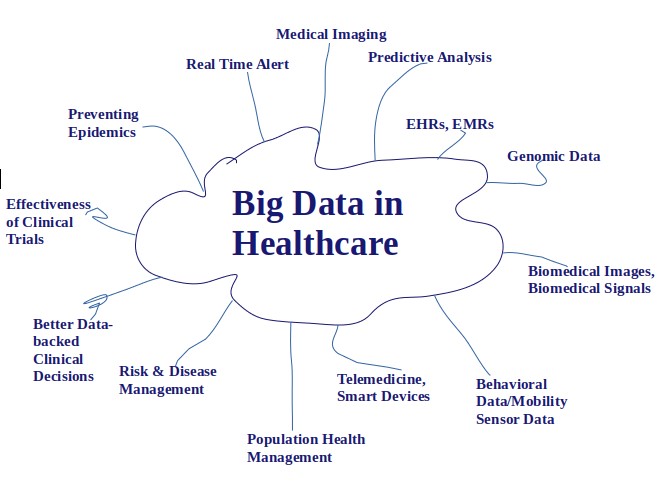Big data is transforming the healthcare industry, providing unprecedented insights into patient care, disease prevention, and population health. In this article, we will explore how big data is revolutionizing patient care, and the benefits it provides for healthcare providers and patients.
Introduction: The Role of Big Data in Healthcare
Big data refers to the massive volumes of data generated by healthcare systems, including electronic health records (EHRs), medical imaging, and genomics data. By analyzing this data using advanced analytics tools, healthcare providers can gain valuable insights into patient care, disease prevention, and population health.
How Big Data is Revolutionizing Patient Care
- Personalized Medicine
Big data is enabling personalized medicine, which tailors treatments and therapies to individual patient needs based on their genetic makeup, medical history, and lifestyle factors. By analyzing large volumes of patient data, healthcare providers can identify trends and patterns that enable personalized treatments, reducing the risk of adverse reactions and improving patient outcomes.
- Disease Prevention
Big data is also helping healthcare providers identify and prevent disease outbreaks. By analyzing population health data, healthcare providers can identify risk factors and predict disease outbreaks, enabling them to take proactive measures to prevent the spread of disease.
- Treatment Optimization
Big data is enabling healthcare providers to optimize treatments and therapies, reducing costs and improving patient outcomes. By analyzing patient data, healthcare providers can identify the most effective treatments for different patient populations, reducing the need for trial-and-error treatments.
- Improved Patient Engagement
Big data is also improving patient engagement, enabling healthcare providers to communicate more effectively with patients and provide tailored health information. By analyzing patient data, healthcare providers can identify patients who are at risk of non-compliance with treatment plans, and provide targeted support and resources to improve patient engagement and outcomes.
Examples of Big Data in Healthcare
- IBM Watson Health
IBM Watson Health is a big data analytics platform that helps healthcare providers analyze patient data to improve patient care, reduce costs, and enhance population health.
- Cleveland Clinic
The Cleveland Clinic is using big data analytics to improve patient outcomes by identifying the most effective treatments for different patient populations and reducing the risk of adverse reactions.
- Blue Cross Blue Shield
Blue Cross Blue Shield is using big data analytics to identify patients who are at risk of non-compliance with treatment plans, and provide targeted support and resources to improve patient engagement and outcomes.
Conclusion
Big data is transforming the healthcare industry, providing unprecedented insights into patient care, disease prevention, and population health. By leveraging the power of big data analytics, healthcare providers can improve patient outcomes, reduce costs, and enhance population health. Examples of big data in healthcare include IBM Watson Health, the Cleveland Clinic, and Blue Cross Blue Shield. As the healthcare industry continues to evolve, big data will play an increasingly important role in patient care and disease prevention.
FAQs
- What is big data in healthcare?
Big data in healthcare refers to the massive volumes of data generated by healthcare systems, including electronic health records (EHRs), medical imaging, and genomics data, that are analyzed using advanced analytics tools to gain valuable insights into patient care, disease prevention, and population health.
- How is big data revolutionizing patient care?
Big data is revolutionizing patient care by enabling personalized medicine, disease prevention, treatment optimization, and improved patient engagement, ultimately improving patient outcomes and reducing costs.
- What are some examples of big data in healthcare?
Some examples of big data in healthcare include IBM Watson Health, the Cleveland Clinic, and Blue Cross Blue Shield.
- How does big data analytics help healthcare providers improve patient outcomes?
Big data analytics help healthcare providers improve patient outcomes by identifying the most effective treatments for different patient populations, reducing the risk of adverse reactions, and providing targeted support and resources to improve patient engagement and outcomes.
- What is the future of big data in healthcare?
The future of big data in healthcare is bright, as it continues to play an increasingly important role in patient care, disease prevention, and population health. As technology and analytics tools continue to evolve, the potential benefits of big data in healthcare are only expected to grow.
Conclusion
Big data is transforming the healthcare industry, providing unprecedented insights into patient care, disease prevention, and population health. By leveraging the power of big data analytics, healthcare providers can improve patient outcomes, reduce costs, and enhance population health. As the healthcare industry continues to evolve, big data will play an increasingly important role in patient care and disease prevention, ultimately benefiting patients and society as a whole.
Read More :
- The Benefits of CRM Applications for E-Commerce and Online Businesses
- The Top Industry Specific CRM Tools Solutions for 2023
- How AI and Machine Learning are Revolutionizing CRM Software
- Why Your Business Needs to Upgrade its CRM Tools in 2023
- The Top CRM Applications for Small and Medium-Sized Businesses
